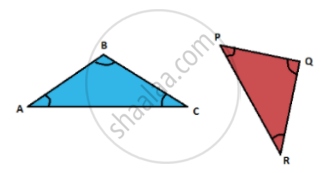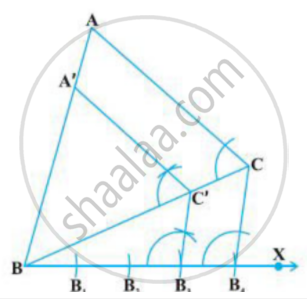Advertisements
Advertisements
प्रश्न
Construct an isosceles triangle with base 8 cm and altitude 4 cm. Construct another triangle whose sides are `2/3` times the corresponding sides of the isosceles triangle.
उत्तर
Steps of Construction
Step 1. Draw a line segment BC = 8 cm.
Step 2. Draw the perpendicular bisector XY of BC, cutting BC at D.
Step 3. With D as centre and radius 4 cm, draw an arc cutting XY at A.
Step 4. Join AB and AC. Here, ∆ABC is an isosceles whose base is 8 cm and altitude is 4 cm.
Step 5. Below BC, draw an acute angle ∠CBX.
Step 6. Along BX, mark three points B1, B2 and B3 such that BB1 = B1B2 = B2B3.
Step 7. Join CB3.
Step 8. From B2, draw B2C' || CB3 meeting BC at C'.
Step 9. From C', draw A'C' || AC meeting AB in A'.

Here, ∆A'BC' is the required triangle similar to ∆ABC such that each side of ∆A'BC' is `2/3` times the corresponding side of ∆ABC.
APPEARS IN
संबंधित प्रश्न
ΔRST ~ ΔUAY, In ΔRST, RS = 6 cm, ∠S = 50°, ST = 7.5 cm. The corresponding sides of ΔRST and ΔUAY are in the ratio 5 : 4. Construct ΔUAY.
Construct a triangle similar to a given ΔABC such that each of its sides is (5/7)th of the corresponding sides of Δ ABC. It is given that AB = 5 cm, BC = 7 cm and ∠ABC = 50°.
Draw a line segment AB of length 7 cm. Using ruler and compasses, find a point P on AB such that `(AP)/(AB) = 3/5 `.
∆AMT ~ ∆AHE. In ∆AMT, AM = 6.3 cm, ∠TAM = 50°, AT = 5.6 cm. `"AM"/"AH" = 7/5`. Construct ∆AHE.
Find the ratio in which point T(–1, 6)divides the line segment joining the points P(–3, 10) and Q(6, –8).
ΔABC ~ ΔPBR, BC = 8 cm, AC = 10 cm , ∠B = 90°, `"BC"/"BR" = 5/4` then construct ∆ABC and ΔPBR
To divide a line segment AB in the ratio 4 : 7, a ray AX is drawn first such that ∠BAX is an acute angle and then points A1, A2, A3, .... are located at equal distances on the ray AX and the point B is joined to ______.
Draw the line segment AB = 5cm. From the point A draw a line segment AD = 6cm making an angle of 60° with AB. Draw a perpendicular bisector of AD. Select the correct figure.
If I ask you to construct ΔPQR ~ ΔABC exactly (when we say exactly, we mean the exact relative positions of the triangles) as given in the figure, (Assuming I give you the dimensions of ΔABC and the Scale Factor for ΔPQR) what additional information would you ask for?

The image of construction of A’C’B a similar triangle of ΔACB is given below. Then choose the correct option.

